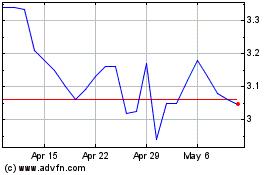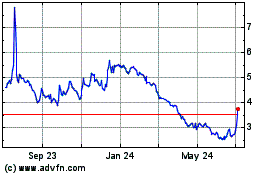Earnings Misses Hurt More This Season -- WSJ
April 25 2019 - 3:02AM
Dow Jones News
By Corrie Driebusch
This article is being republished as part of our daily
reproduction of WSJ.com articles that also appeared in the U.S.
print edition of The Wall Street Journal (April 25, 2019).
Many companies are beating expectations this earnings season,
helping push major indexes to record levels. But for those that
miss, the punishment has been more severe than usual.
That means the stakes are high during a busy earnings week in
which nearly 150 companies in the S&P 500 are reporting
results.
On average this earnings season, shares of companies whose
results have fallen short of analysts' estimates have declined 3.2%
from two trading days ahead of earnings to two sessions after the
report, FactSet data through Wednesday morning show. That is more
than the 2.5% average drop over the past five years.
A possible cause for the underperformance is that companies have
been giving guidance either in line with or below analysts'
expectations, according to Bank of America Merrill Lynch. BAML
analysts say mentions of "better" or "stronger" versus "worse" or
"weaker" are tracking at their lowest since the first quarter of
2016.
On Wednesday, satellite-radio company Sirius XM Holdings Inc.
became one of the latest to fall into the trend, with its stock
declining 7.2% after it reported a quarterly profit below
expectations.
Sirius joins others such as Intuitive Surgical Inc., whose stock
tumbled 7% Monday, its largest decrease since 2014, after the maker
of robotic systems used in surgery reported a slightly
smaller-than-expected increase in quarterly sales and missed profit
estimates. Last week, Bank of New York Mellon Corp.'s shares fell
nearly 10% after it reported earnings and revenue short of Wall
Street's expectations. Earlier this month, Walgreens Boots Alliance
Inc.'s shares lost 13% after the pharmacy chain also missed sales
and earnings estimates.
In its earnings call with analysts, BNY Mellon's chief
executive, Charles W. Scharf, referenced "weakness in investment
management and net interest income" as a reason for the custody
bank's performance during the quarter, according to transcripts of
the call.
Roughly one-third of S&P 500 companies are posting their
quarterly earnings this week. On Thursday, about 65 of those
quarterly reports will arrive, including from tech giants Intel
Corp. and Amazon.com Inc. as well as coffee chain Starbucks Corp.
That is after roughly 40 S&P 500 companies, including Facebook
Inc. and Microsoft Corp., reported Wednesday.
Stocks are coming off an impressive run. Following their steep
drop in late 2018, U.S. stocks have rebounded sharply this year.
Through Wednesday's close, the S&P 500 is up 17% in 2019, and
for the first quarter the broad index posted its largest percentage
gain in decades. On Tuesday, the Nasdaq Composite and S&P 500
closed at records.
This rise has come despite a potential first-quarter-earnings
slowdown because of worries about the potential impact of rising
wage and commodities costs and a stronger dollar. Those worries
became more acute as the first quarter progressed. At the end of
December, analysts anticipated S&P 500 companies' earnings
would grow 2.8% from a year earlier, according to FactSet. By the
end of January, they were predicting earnings would decline. By the
end of the first quarter, they estimated profits had contracted 4%
from a year earlier, according to FactSet. That could also be good
news for stock prices, as lowered expectations make it easier for
companies to beat them.
With a little more than one-quarter of companies reporting
results, first-quarter S&P 500 earnings are on pace to register
a contraction of 3% from the year-ago period, according to FactSet.
If that holds, it would mark the first time quarterly earnings have
contracted since 2016.
Through Wednesday morning, nearly 80% of S&P 500 companies
that had reported earnings had surpassed analysts' estimates,
FactSet data show. Among the big winners Tuesday were
social-networking platform Twitter Inc., whose shares jumped 16% ,
their largest percentage rise since October 2017, and industrial
conglomerate United Technologies Corp., whose stock rose 2.3%.
Write to Corrie Driebusch at corrie.driebusch@wsj.com
(END) Dow Jones Newswires
April 25, 2019 02:47 ET (06:47 GMT)
Copyright (c) 2019 Dow Jones & Company, Inc.
Sirius XM (NASDAQ:SIRI)
Historical Stock Chart
From Mar 2024 to Apr 2024

Sirius XM (NASDAQ:SIRI)
Historical Stock Chart
From Apr 2023 to Apr 2024
